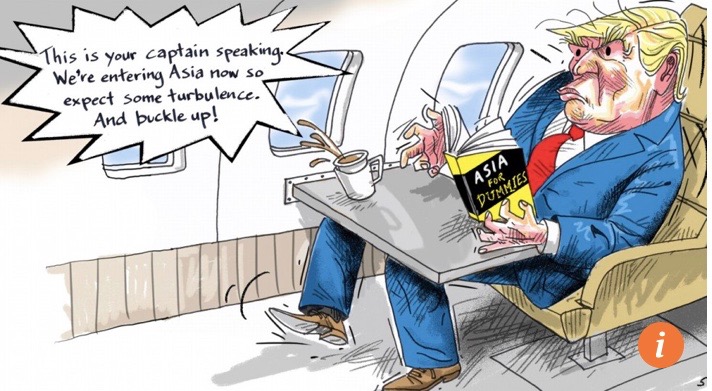Suddenly it’s all action in Asia: The Japanese are still tallying up the margins and implications of PM Abe Shinzo’s lower house triumph. The Chinese are epically engrossed in their Party Congress whose consensus is the crowning of Mr Xi Jinping as the heir to Deng Xiaoping-ism and anointing his vision as The (only) Way. The South Koreans are praying northward that another nuclear-test shoe doesn’t drop. The Vietnamese, seeking to engage others in pushback against Beijing’s possessiveness over seas nearby, will all but beg Mr Trump to artfully shape a deal; and in Manila Philippines President Rodrigo (“Rody or Digong”) Duterte will try to enlist our president in his verbal war on human-rights groups, not to mention his shooting war against drug gangs. Each of these governments present roomfuls of challenge to a post-Obama America needing prioritization of its national interests in the Asia-Pacific.
Air Force One’s first touch-down on the tour is in Hawaii, which offers one special strategic view: from the headquarters of the U.S. Pacific Command. Its military, perched 600 feet above Pearl Harbor, faces out toward the 52% of earth’s surface that is the command’s Pentagon remit. Its well-educated officers will provide Trump with every reason to remain engaged in Asia militarily. No one in the room will make the case for lowering the U.S. profile. Will that rub up against Trump’s expressed inclination toward an America-First, neo-George Washington edginess about foreign entanglement?
First Asian touch-down will be Japan, once wartime enemy, now ally. PM Abe, so brilliant in calling for a snap Diet election, has also been brilliant in romancing Trump. Proud Japanese diplomats contend that Abe has either met or talked over the phone with Trump more than any other Asian leader – starting with the Nov. 10 congratulatory call from Tokyo and including, recently, an Oct. 4 phone ostensibly to express his condolences over the Las Vegas tragedy but also to slip in thoughts on the North Korean buildup. It is expected that Mr Trump will meet with family members of DPRK abductees to pressure North Korea “to resolve this issue once and for all,” in the words of one long-frustrated Japanese diplomat.
Seoul gets the next Air Force One honor. There Trump meets a deeply conflicted Moon Jae-In, president of the Republic of Korea. Moon is known to accept that if the U.S. feels its territory comes under “imminent threat,” South Korean concerns would scarcely make it into Trump’s decision room. Where Moon’s nation retains a preeminent role is monitoring and perhaps even alleviating the human crisis up north. It is hard to convince some people that helping North Koreans, even starving ones, doesn’t help Mr Kim Jong Un. It is even harder to convince the` grumpy Trump that a heartfelt humanitarianism is not the same thing as an insidious creeping pacifism.
Air Force One then lands in Beijing, in the wake of the Party Congress. “Trump‘s visit to China and ROK will be of crucial importance,” explains a veteran Japanese diplomat. “On one hand, we do need China’s cooperation to rein in North Korea. On the other, Mr. Xi will emerge an even stronger leader. He will reign over the ‘Party-State’ system that in essence will not tolerate any challenge to the legitimacy and supremacy of the Communist Party. We must expect China under a second-term Mr. Xi to be more than ever self-assertive.” One thing Mr Xi should ask of Trump is to offer Kim Jong Un a peace treaty, multilateral security guarantees and an economic opening if he agrees not to test more nuclear weapons or long-range missiles. In return Mr Xi should promise that, if Kim refuses, China will be very upset.
Vietnam – next — may have a nervous breakdown if Mr Trump and Mr Xi get along too well. President Tran Dai Quang will try to sell Mr Trump on a policy toward China that “implicitly rejects the notion that the South China Sea is China’s national backyard,” as one Vietnamese diplomat puts it, while not playing into Beijing’s hands by making it a Vietnam versus China dustup by “squarely putting the issue into a broader regional and even international context.” Quang’s government is known to sympathize with the pressure Trump is under to draw on China’s strengths and influence with Pyongyang- but hopes it won’t give away the regional maritime store. But in this regard, Mr Trump is listening to Mr Abe. Hanoi will find it difficult to lure Mr Trump away from believing that Mr Xi can do more for him than Mr Quang.
The last stop is Manila, a late add. Given Duterte’s ‘pumping iron’ approach to everything, Trump should find this stop the easiest to fathom – simple slogans, macho poses, deep thought avoided. But perhaps after the whirlwind he was just through, a kind of diplomatic eye candy might just what the spin doctors ordered.
Trump gets massive media criticism, admittedly much of it deserved. A few verbal hiccups and diplomatic pratfalls on the Asian swing are all but unavoidable. Even so, the responsible media must start downplaying the obvious personality flaws. Asia, by far, is now the most important economic and political region on earth. He’s still the president, until he’s not.
Columnist Tom Plate is the founder of Asia Media International at Loyola Marymount University and author of the new book ‘Yo-Yo Diplomacy.’

